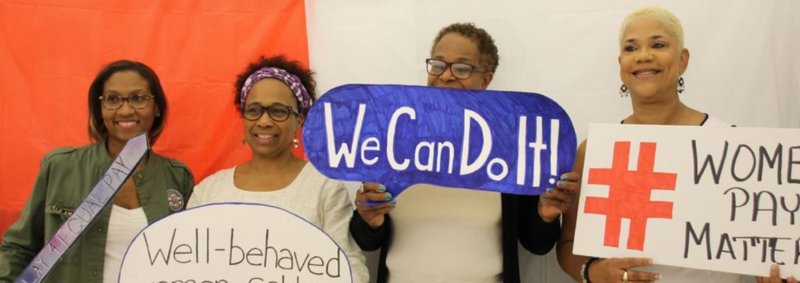Elevating Grassroots Power on Child Care at a Moment of Transformative Change
Over the past year, under the harsh light of the pandemic, we’ve all witnessed what organizers and advocates have said for decades as they decried a broken child care system:
Nearly half
of the country’s child care slots were at risk of disappearing and caregivers—predominantly women—shouldered the burden.
With women three times more likely than men to leave the workforce during the pandemic due to caregiving demands, women have lost three decades of labor force gains in a single year. Meanwhile, child care workers, who are disproportionately women of color and earn poverty-level wages for essential work, saw jobs disappear overnight in a sector that was already teetering on the edge.
Grassroots Child Care Organizers in the Driver’s Seat on Policy
Over the last few decades, national child care advocates have made meaningful progress, including securing increased federal funding for the Child Care Development Block Grant, one of the few federal lifelines that helps parents access affordable child care. Yet, the total amount of public investment remains wildly insufficient to meet American families’ care needs and to adequately compensate providers. By bridging national advocacy efforts with the local community engagement of grassroots organizations, which work primarily with parents and providers, the movement for child care has the opportunity to build on these advances, and generate the political will needed for policymakers to take transformative action.

The Raising Child Care Fund (RCCF) is a pooled fund that equips grassroots organizers with resources and connections to bolster their state and local work while helping to shape national advocacy efforts. Founded in 2018 by Heinz Endowments , Heising-Simons Foundation, Irving Harris Foundation, Pritzker Children’s Initiative and Vanguard, RCCF aims to have the policies debated at the national level led by the people whose lives are shaped by those policy decisions.
To RCCF and its grantees, community-based, grassroots organizing is the key to lasting transformational change. “Organizing looks like centering the people that are impacted by whatever issue you are organizing around, putting them in the driver’s seat, and giving them the resources they need to step into their power,” says Mica Whitfield, the state director of 9to5 Georgia, an RCCF grantee.
Similarly, LaDon Love, Executive Director of Spaces in Action, another RCCF grantee in Washington, DC, echoed the importance of centering the narrative on the parents, providers and communities most impacted, saying, “We need to make sure that the story is coming from our lived experiences and expressing our values and what we feel should be the solution.”
When Danielle Atkinson got pregnant with her first child, she struggled to find community among the groups organizing moms. “The space looked pretty white,” she says. Speaking at a virtual event hosted by RCCF, Danielle recounted how the marginalization of mothers of color motivated her to start Mothering Justice, an RCCF grantee in Michigan: “Stories like mine and other people of color were being pushed to the background because we were seen as a liability to the conversation. We didn’t fit into the narrative. I wanted to start an organization that was authentic to the people who look like me.”
Organizing looks like centering the people that are impacted by whatever issue you are organizing around, putting them in the driver’s seat, and giving them the resources they need to step into their power.
Mica Whitfield, state director of 9to5 Georgia, a Raising Child Care grantee
RCCF targets the bulk of its resources to provide local groups with the funding they need to do what they do best — recruiting, educating and empowering parents and providers. By fostering connections between national and local groups, RCCF also works to place those most impacted by the child care crisis at the center of a renewed national push, strengthening and broadening the call for all families to be able to access high quality child care for all children. Working in collaboration with partners, like Community Change and Family Values @ Work, among others, RCCF facilitates training and learning opportunities, including from other advocacy movements that have blended national and local efforts.
Organizers have been central to relief efforts for the child care workforce, including successful organizing that secured hazard pay for workers in New Mexico and $30 million in new state funding relief grants in Minnesota. Beyond state level advocacy, RCCF grantees’ deep engagement at the national level helps to ensure that the upcoming legislative proposals on the care economy reflect priorities of the families and early educators they work with every day.
Whether organizing town halls with members of Congress or pushing governors to take action on early childhood education, RCCF grantees are working to demand a more equitable child care system at all levels of government and to hold elected officials accountable.
Boosting Resources that Build Power
Although investments in grassroots organizing have been shown to build power and strengthen accountability among policymakers to the communities most impacted by policy change, grassroots efforts remain grossly underfunded, particularly on child care issues. Crucially, RCCF grantees will only be able to harness this grassroots power if they have the resources to do so. Imaginable Futures is excited to support RCCF’s efforts to expand its reach to more organizations and plans to invest more in grassroots power building over time.
To meet this incredible moment of opportunity, child care needs a coordinated and robust movement that builds consensus on a national vision and is grounded in the voices of families and providers. To do that, we must give organizers who have been doing this work for decades the resources they need to step into their own power and drive the change we need.